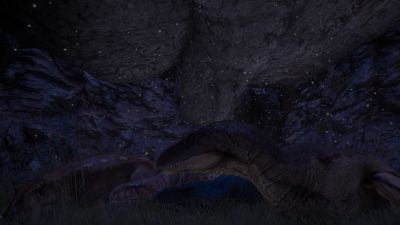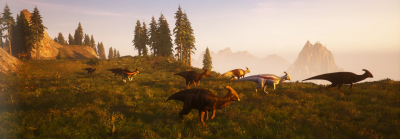Difference between revisions of "Groups"
| (15 intermediate revisions by 2 users not shown) | |||
| Line 1: | Line 1: | ||
[[File:Group.jpg|right|thumb|400px|border|A group of [[Megalosaurus]]]] | [[File:Group.jpg|right|thumb|400px|border|A group of [[Megalosaurus]]]] | ||
| − | + | Players are able to form groups. These groups can either be called herds or packs depending on the creature. | |
| − | [[ | + | A herd can consist of three different mixed species of [[Herbivorous Creatures|herbivores]]. Group limits are inter-species. Each creature counts 1/SpeciesLimit towards the cap. Players cannot be invited to the group (hard limits) or players get comfort drops (soft) if the sum of all members exceeds 1. |
| − | + | A pack consists of a single species of [[Carnivorous Creatures|carnivore]]. | |
| − | Over time, | + | Creatures who are not in the same group will suffer from [[Comfort|comfort]] loss if they remain near each other due to intimidation. Intimidation may be worse depending on how much negative [[friendship]] the players have with each other. |
| + | |||
| + | To join/invite somebody to a group, you can use one of the following methods: | ||
| + | * Double-tap the [[Player List|player list]] key (Default: Tab), scroll to the desired player's name, click the action drop-down, and select "Invite player to group". | ||
| + | * The [[Chatbox]] can be used to invite someone to a group by using the /invite command. | ||
| + | * By walking up to an invitable creature, you can press the USE key (Default: E) to send an invite. | ||
| + | * Use the in-game [[Group Finder|group finder]] tool to open the party for others to request invites into your group. | ||
| + | |||
| + | Once in a group, you'll be able to see the locations of your groupmates via the location of their player tags. You're able to toggle the display of these tags by using the toggle group tags key (Default: i). | ||
| + | |||
| + | Over time, the members of a group will become [[friendship|friends]] with each other, which increases the amount of comfort when near each other and reduces the amount of friendly fire. | ||
| + | |||
| + | While in group with a member of the same species and the opposite gender, players can make use of the [[nesting system]] to bring new life into the world. | ||
[[File:Paraherdsunrise.png|right|thumb|400px|border|A [[Parasaurolophus]] herd migrating during sunrise]] | [[File:Paraherdsunrise.png|right|thumb|400px|border|A [[Parasaurolophus]] herd migrating during sunrise]] | ||
| − | + | [[File:Velociraptor pack.jpeg|400px|thumb|right|A [[Velociraptor]] pack hunt a lone [[Megalosaurus]]]] | |
| − | [[File: | ||
Latest revision as of 00:43, 30 October 2020

Players are able to form groups. These groups can either be called herds or packs depending on the creature.
A herd can consist of three different mixed species of herbivores. Group limits are inter-species. Each creature counts 1/SpeciesLimit towards the cap. Players cannot be invited to the group (hard limits) or players get comfort drops (soft) if the sum of all members exceeds 1.
A pack consists of a single species of carnivore.
Creatures who are not in the same group will suffer from comfort loss if they remain near each other due to intimidation. Intimidation may be worse depending on how much negative friendship the players have with each other.
To join/invite somebody to a group, you can use one of the following methods:
- Double-tap the player list key (Default: Tab), scroll to the desired player's name, click the action drop-down, and select "Invite player to group".
- The Chatbox can be used to invite someone to a group by using the /invite command.
- By walking up to an invitable creature, you can press the USE key (Default: E) to send an invite.
- Use the in-game group finder tool to open the party for others to request invites into your group.
Once in a group, you'll be able to see the locations of your groupmates via the location of their player tags. You're able to toggle the display of these tags by using the toggle group tags key (Default: i).
Over time, the members of a group will become friends with each other, which increases the amount of comfort when near each other and reduces the amount of friendly fire.
While in group with a member of the same species and the opposite gender, players can make use of the nesting system to bring new life into the world.

